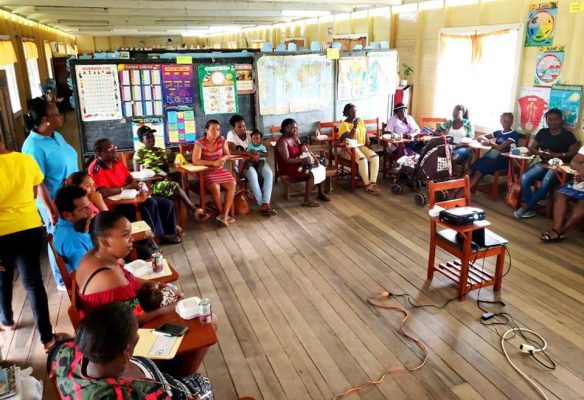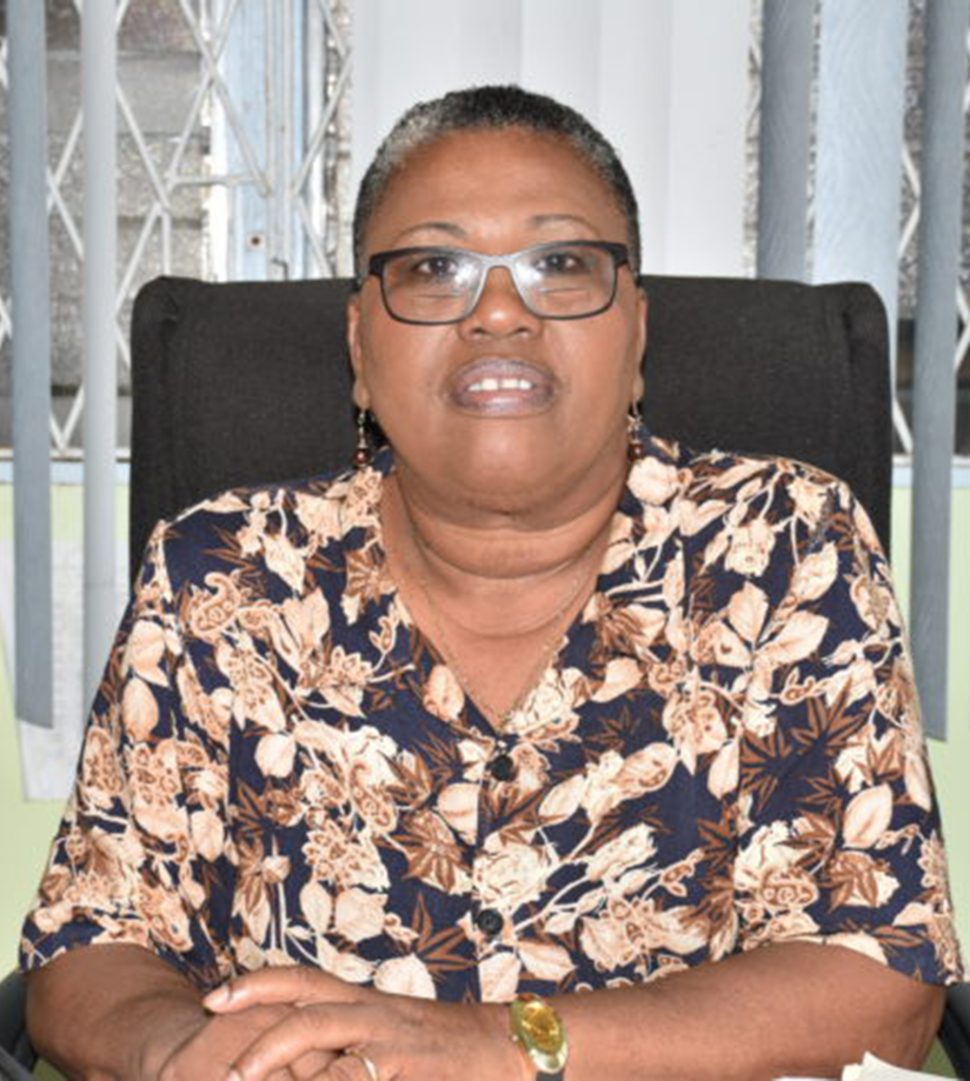After giving birth to a baby in the Georgetown Public Hospital, a mother leaves undetected making the child a ward of the state and more specifically the Child Care and Protection Agency (CC&PA).
The baby will be fostered and may be eventually adopted if his/her parents are not found. This is just one of the many real scenarios faced by the agency and according to its Director Ann Greene, every month some 2 children are abandoned by their parents.
One mother left her infant baby in a taxi with the father who in turn took the child to the agency as, according to him, he was unable to take care of the baby. The baby was placed in care as the man indicated he was not even sure he was the father. The child was eventually adopted.

Some of them are teenagers who are taken to the agency’s office, often by their mothers who appear frustrated and indicate they can no longer “handle” them. But Greene made it clear that this should not be the option and while the agency is prepared to work with parents who may be experiencing difficulties, parents need to take responsibility for their children.
With child neglect being the leading form of abuse—there have been some 229 reports of neglect already for the year—Greene said that the agency is looking at applying the section of the CCPA Act that compels parents to pay the state monthly for children they have abandoned or neglected. She pointed out the same amount the state has to pay for children to be fostered on a monthly basis should be paid by the parents who shirk their parental responsibility.
In an interview with the Sunday Stabroek the agency’s director said it is hard to grapple with the fact that some parents do not want their children.
Parents of some older children would claim they are too frustrated to deal with their children’s difficult attitudes, but the agency encourages them and tries to give them support. There are cases as well where children will leave their homes and turn up at the agency complaining about being ill-treated by their parents. In most cases those children are in the agency’s system.
The agency works with families with the intention of having the child/children remain in or return to the home and continue to monitor the situation as a family environment is always best suited for a child.
“…It is behaviour modification that is needed and the parents are at times at their wits end,” Greene explained.
But as with the babies there are cases where younger children are unwanted by their parents and Greene told of the case where a four-year-old was put out of the home by her mother and a neighbour contacted the agency. This child had to be placed with a relative until the mother managed to sort her life out, as, according to Greene, “things were happening with her and the father.
“We had to work with her, she had to see the psychologist and we had to go through the whole process and eventually the child was returned to her.”
In cases where the children are young, Greene said, they eventually try to have them adopted if their parents are unwilling to take them back as it is unfair for a child to spend his/her entire childhood in state care.
“We have a child … spend their entire childhood in either foster care or in an institution waiting for the parents to come back. In whose interest we are working?” questioned Greene and she later answered that it would certainly not be in the interest of the child.
She stressed that children lose development when they remain in an institution, particularly if they are under 3 years old. As a result, the agency now has a policy that sees no child under 3 being placed in an institution, instead they are placed with a relative or in a foster home.
“We have to act in the best interest of the child, not in the best interest of the parent,” Greene maintained, adding that many times the best interest of the child is not being in the care of their parents.
Greene said if it is a case, as has happened in the past, where a parent comes and asks for the child or children to remain in state care for a while they work through a difficult patch in their life then the agency will assist that parent to get their life back on track.
“We can keep the children and we then work with you to get you to that point, we have had several cases like that,” she said.
But there are cases where parents are worked with and are given all the needed support but still refuse to take responsibility for their children.
Greene said it is those parents they would want to see taken to court as the Act provides and for them to be charged. She said there are too many parents who take the easy route and she is working with the agency’s lawyer to have one case brought against an errant parent.
“This is to get the parents to understand their responsibility… Why would you want to have then languishing in an institution? I am saying people come take back your children and help us take them out of institutions. Come take them back and work with us,” Greene pleaded.
There are many cases where the parents cannot be found. There are some cases where the agency encourages biological or kinship foster care in an effort to have the child be cared for by a blood relative. This is in an effort to reduce the number of children who age-out of the system without connection to a family which is not in their best interest.
The pain of being abandoned and neglected is a secret one, Greene said, and this pain is in them until adulthood. Those children become hurt adults and, in some cases, hurt others and turn to a life of crime.
“So, an institution might be a life saver for a start but it is not for them to stay forever,” Greene stressed.
For this year alone, the agency has about 30 children who are set to age-out of the system. However, the Ministry of Social Protection now has a halfway home which accommodates those above the age of 18 who study or are working. At present, there are 15 persons in the transition home which is governed by rules.
400 cases of abuse
Meantime Greene clarified that while in January alone the agency received over 495 abuse reports against children these were not just limited to sexual abuse but to abuse in general.
However, out of that number over 100 were cases of sexual abuse.
“This [the reported cases] is the tip of the iceberg because as you know a lot of the cases go unreported because child abuse and particularly sexual abuse is behind closed doors and the victims … do not have a voice to even tell about it,” Greene told this newspaper.
She pointed out that mothers are the main abusers of children followed by fathers.
“Stranger abuse is very minute, even the sexual abuse it is somebody close… that is how they get to abuse the child because they trust them,” Greene said adding that if a stranger attempts to assault a child, most times the child flees.
And many times, the abuse remains a secret because the children genuinely love their abusers and do not want to get them into trouble and they suffer in silence. And even when they do reveal it, family members attempt to conceal the abuse and often make it appear as if it is the child’s fault.
“Let me tell you over 50% of [abused] are not believed by their parents, by their mothers when they say it is their fathers or their stepfathers…,” Greene said.
It is in cases like those that the agency is forced to remove the child from the home because if the parents are disbelieving the child then they would not protect the child from further harm as the alleged perpetrator remains in the home.
She believes such parents should be charged but noted there is still work to be done to sensitize people and for charges to be instituted under the Act, because if there is proof that the parents know and fail to report and protect the child then they become an accessory to the crime.
“Because a lot of them know that the child was being abused by the man in the house…,” she said. She noted that the agency does not institute charges. This is done by the police who often have to be advised by the Director of Public Prosecutions.
“If we use to charge, I would charge one every day… and get you in the court by afternoon,” Greene said adding that the agency believes the children until there is a reason for them not to and there is seldom any such reason.
“It is not in children’s DNA to make up stories about being sexually abused… and particularly about people who they love, who they trust. It is so hard to even tell it and it is harder to make up a story to put your father in trouble, or your grandfather or somebody in trouble,” she said.









